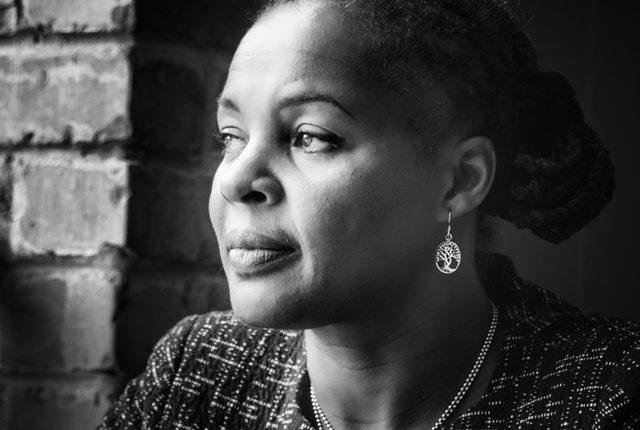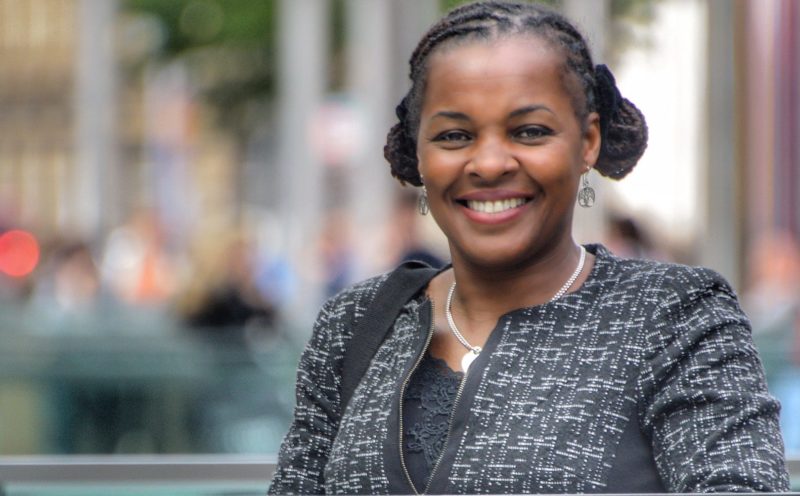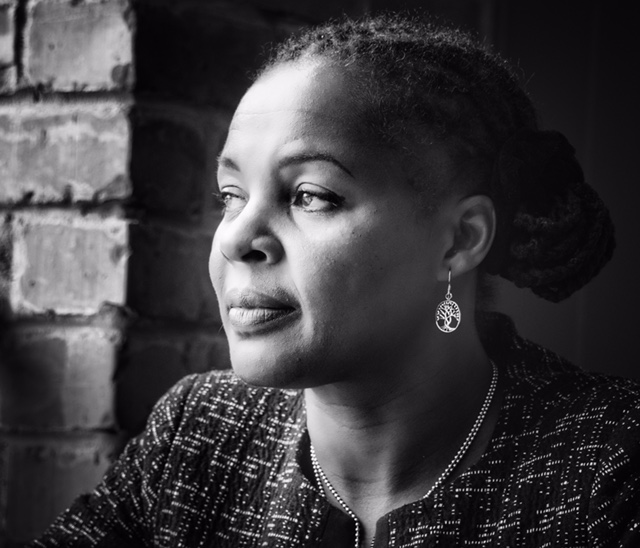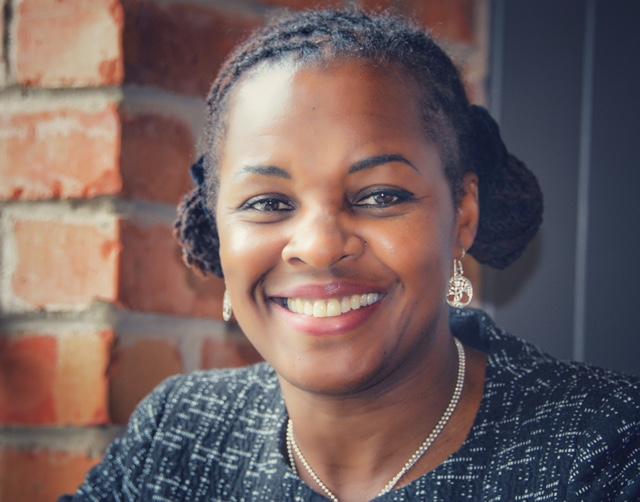
A great copper and a force for change – Irene’s 25 years of breaking barriers
As a young girl in Toxteth Irene Afful was abused by racist police officers but later became Merseyside Police’s first black female inspector and helped transform its culture – now she helps others fulfil their potential. Tony McDonough reports

As a child playing on the streets of Toxteth in the mid-1970s and early 80s just the sight of a police van would induce terror and fear into Irene Afful.
“The estate where we lived was pedestrianised so myself, my sister and my brother would always be playing out with the other kids,” said Irene.
“Black police vans would often prowl the streets and the officers would hang out of the window and shout things at us. Horrible things such as ‘nigger’, ‘black arse’ and ‘get back to where you came from’.
It was perhaps remarkable, then, that Irene would later join Merseyside Police, rising through the ranks to become the force’s first ever female black inspector.
Now a businesswoman running her own coaching and consultancy venture – Ametrine Coaching and Consultancy – Irene’s story is one of a pioneer who battled endemic racism and sexism to eventually help bring about cultural change within the force.
However, it wasn’t always a mantle that sat comfortably on her shoulders. Rather than being defined by her race or sex, Irene’s main motivation during her 25 years on the force was to be a good copper.
Toxteth riots
Her life story began in the leafier south Liverpool suburb of Wavertree. When she was aged around seven her parents divorced. Irene’s father was a merchant seaman who sadly succumbed to excessive drinking and domestic violence. The family ultimately had to flee the family home to escape the violence.
Their house was repossessed and the family was eventually rehoused in a Toxteth maisonette.
Liverpool 8 exploded in the summer of 1981 as the tensions caused by persistent police harassment of black people came to a head. Backed by the then Merseyside Chief Constable, Kenneth Oxford, officers had used the hated, and now discredited, ‘sus’ laws to stop and search black youths at will.
“Members of my own extended family also had bad experiences at the hands of the police – being put in the back of a van and beaten up,” explained Irene. “The tension in the area was palpable so it was no surprise when the riots happened.
“We were kept in because my mum was very strict with us and she didn’t want us caught up in any trouble. In fact, she sent us to school out of the area so we didn’t mix with anybody who may get into trouble.
“The riots were frightening. All of these people turned up from nowhere coming on to the estate – people we had never seen before. So clearly they were coming in just for the trouble.
“But there were also many people on the estate who had just had enough of how they were being treated by the police.
“We weren’t allowed out at night-time but my auntie’s balcony overlooked Upper Parliament Street and my mum would let us go there so we could watch.”
From here the young Irene watched the mayhem unfold as people fought pitched battles with the police and shops and businesses were destroyed … “it was surreal”.
Back to school
Irene’s sense of bewilderment was complete when she returned to her school – Notre Dame – in the genteel surroundings of Woolton.
She said: “My mum’s advice was always ‘keep your head down, do as you’re told and get yourself an education.
“I had a really good experience in school, even though I was in a predominantly white area. I suffered racist abuse outside of the school but never in it and I was only one of a handful of black kids in the school at the time. I loved it.”
Starting work
In 1982, the family returned to Wavertree to live. Irene’s mum wanted her children to go to university but all three had seen her struggle financially to bring them up and they all left school at 16 to find jobs and support the family financially.
Irene began working for Liverpool City Council and worked her way up to a supervisory role in the child protection department, a job she excelled at. She attended college on day release to study public administration and law.
Working in child protection brought Irene in frequent contact with the police. At first wary, given her experiences as a child, she eventually became friends with two male detectives, socialising with them at the end of cases.
“They were nice – just normal, ordinary guys. One day one of them said to me ‘have you ever thought of joining the police?’,” said Irene. “I laughed, but he persisted with the idea adding that my track record of investigative work showed I would make a good detective.”
The idea started to germinate in Irene’s mind but she was still resistant. She spoke to her family and some were dead against it.
She added: “Others were more open to it, particularly my mum, who said ‘you do what you want to do with your life. Don’t let anybody dictate to you what you should or should not be doing’.”
On the beat
Irene applied as a purely academic exercise, not expecting to be accepted. But to her surprise, she was, scoring top marks in the entrance exam.
She underwent her 10 weeks basic training and then was sent to a local station for five weeks training on the job. She was assigned a sergeant whose role it was to tutor and guide new officers. But it didn’t get off to the best of starts.
“One day I walked into a room where my sergeant was talking to a group of officers – he had his back to the door and didn’t see me come in,” said Irene. “He was telling them a racist joke. The people who saw me come in just fell silent. He turned around, looked at me and went bright red.
“He took me into his office and said ‘I am so so sorry, you should never have heard that’. And I replied ‘regardless of whether I was in the room or not you should never have said what you said’.

“I was so angry and he acknowledged that I was right and he said if I wanted to put in a complaint, he would show me how. I said ‘I won’t put a complaint in but if I ever hear anything like that from you again I will have your job’. Even though I was a trainee officer I had been a manager in my previous job so I wasn’t wet behind the ears.”
Irene was then assigned to Lower Lane in north Liverpool, walking the Croxteth and Norris Green beat in what was one of the most deprived, and whitest, areas of the city.
She said: “Not only was I the enemy as a ‘pig in uniform’ but as a ‘black pig in uniform’.
“But as I got to know people and the area I realised most people were decent and just trying to get on with their lives in what was a very poor area. I eventually loved it there.”
Rapid progression
As her policeman friend had predicted, Irene had the makings of a great detective and, within three years, she was out of uniform and in CID, spending time in the burglary squad, car crime and eventually back on her old beat in child protection.
“I was there for three years, running my own investigations,” she added. “Thanks to my old job I knew the system and so I loved doing that kind of work.”
She took other roles in Knowsley and Wirral and also did a stint as a critical incident manager, providing 24/7 emergency response cover. She also spent some time working in professional standards – the department that investigates other officers.
After 12 years with Merseyside Police, Irene rose to the rank of inspector – the first black female inspector in the force’s history. For someone not on the fast-track that was pretty quick – for a black woman it was unprecedented.
Racism exposed
In 2003, a television expose – The Secret Policeman – uncovered endemic racism in a police training school shared by several North West forces, including Merseyside.
Irene received a phone call from the deputy chief constable to revive the Merseyside branch of the Black Police Association (BPA), which had fallen by the wayside following the death of the previous chair. She put herself up for election as chair and was successful.
She was transferred to headquarters and had to review all the force’s policies in respect of the new Race Equality Act that had just become law. But she wasn’t entirely comfortable in the role.
She explained: “As much as I wanted to change the way the force treated black people and black communities, that wasn’t the way I saw my career going. I didn’t want my career defined by my colour.
“I was quite lucky in my career until I joined the BPA – and then I was seen as the ‘enemy within’ by the supervisors and managers. They saw me as an agitator even though that is not what I did. That didn’t help my career.”
Feeling let down
Another scandal followed when it was revealed racist, sexist and homophobic emails had been circulated among both junior and senior officers and other staff on the force.
Irene was called in by the chief constable to advise on and manage the repetitional risk posed to the force. However, she wasn’t allowed to know the identities of those who had distributed the emails, some of which she described as “absolutely horrendous”.
“I know it went as high as inspectors and chief inspectors but, sadly, no one was sacked,” she said. People were just given warnings.”
Irene was angry and disillusioned. The then Chief Constable, Bernard Hogan-Howe, rang her to say he fully understood how she felt. She added: “I wanted to know who they were because some of these people may be backing me up when I was out on the job.
“Hogan-Howe was really lovely about how I felt and offered support but I thought ’20 years on from the riots and it feels like nothing has changed’.”
Back on the job
Irene decided to step down from the BPA and put her energies back into her frontline policing career. She joined the Major Incident Team, investigating murders.
She spent five years in the unit and it was a role she initially relished. It was also around this time she adopted her son. However, that enthusiasm was soon worn down again when she was passed over for no less than six acting detective chief inspector roles.
She said: “People less qualified than me were being given the jobs and they were all white men.
“I had a word with the boss but I was given a different excuse for each one and I realised I wasn’t going to get anywhere as a black woman in that department. I also think part of it was because I was a single parent and I was on flexible working.”

Other roles followed for Irene. She helped with the youth strategy of the new Police and Crime Commissioner, Jane Kennedy, and then in the community engagement unit, spearheading a drive to bring greater diversity to Merseyside Police.
“That was brilliant for me because I knew I had to change the way the organisation worked,” she said.
“I designed a leadership course and ran a positive action initiative to attract more, not just black people, but women, people from the LGBT community, people with disabilities.
“We would mentor them for 12 months and that went national because other forces liked the work we were doing.”
National role
Irene was later seconded to the College of Policing which saw her work with 21 forces across the country and increase black and ethnic minority representation. Although there had been some progress since she became a police officer, she also saw there was a long way to go.
“The figures from the Home Office were dire,” she said. “The history of the bad blood between the police and black communities meant that black people did not see it as a viable career option.
“I used to be called the ‘Toxteth buckess’ by my colleagues, a slang term for a female criminal. It was used affectionately but it was indicative of the mindset behind it.
“When Anthony Walker was murdered (a black teenager who was killed with an axe in Huyton in a racially-motivated attack) there was a memorial event on the steps of St George’s Hall and I was standing there in full uniform.
“Next moment a black guy comes past and spits at me and calls me a “disgrace”. I decided to say nothing and next minute two women civilians intervened and tore a strip off him.
“I would tell people in the community that they were not helping themselves by always seeing the police as the enemy and that you can’t change the culture unless you join.
“After Stephen Lawrence other forces would not accept they were institutionally racist. But how could they not be when there were hardly any black people in their senior ranks?”
Career change
Police officers can retire on full pension after 30 years’s service. Irene had carried over five years’ pension from her previous public sector role so was able to leave the police after 25 years.
Her final years in the force were spent mentoring and coaching young recruits, with considerable success, and this work sowed the seeds in her mind of a career beyond the police.
As her leaving date approached she started laying the groundwork, approaching The Women’s Organisation in Liverpool who supported her with a business advisor.
In the autumn, Ametrine Enterprise Solutions was fully up and running.
Irene said: “A lot of my clients tend to be women who either want to get back into employment after raising a family to people who want to change their career.

“I have also been approached to work with asylum seekers to help them get ready for employment.”
She is also looking to work with a housing association to mentor its team of outreach youth workers and she is planning to introduce motivational speaking into the business, something she did frequently in her latter years as a police officer.
Irene has been the recipient of a number of awards and nominations. She was listed as one of the top 50 Merseysiders in Diversity Magazine and won a Black Achiever’s Award in 2005 and a Woman of the Year Award in 2007.
Last year she was a nominee in the Female Role Model category in the National Diversity Awards and this year was named on the Northern Power Women Power List
Pioneer for change
It’s clear that Irene was instrumental in bringing about significant cultural change within Merseyside Police. She acknowledges this change and is optimistic for the future of the force.
She said: “What I like now is that there is more dialogue. People feel more empowered to be able to talk about issues. In the past it was just not the done thing.
“Actually, the sexism that I experienced was actually far worse than the racism. But it was accepted and acceptable to be this way. It wouldn’t happen now so things are much better in that regard.
“While there is dialogue – there can always be change.”
